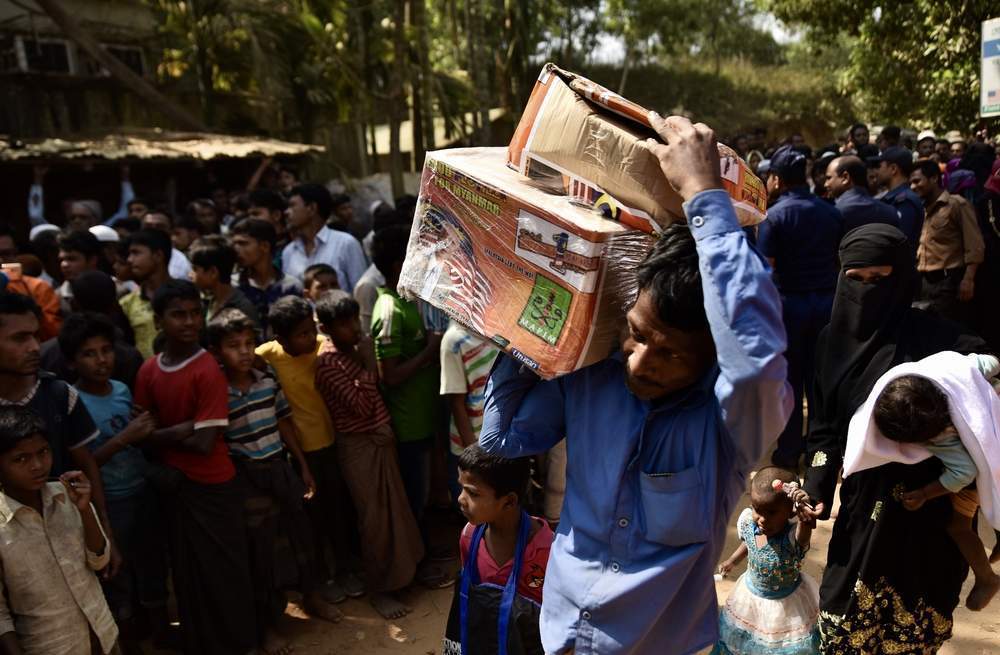
Despite pressure from British politician Jacob Rees-Mogg, Downing Street will refuse to cut the UK’s current foreign aid commitment.
The politician has stepped up his efforts to lower the foreign aid budget following the Oxfam scandal. Aid workers working for the charity were found to have sexually exploited locals in the wake of the Haitian earthquake in 2010. Stories have emerged of workers using prostitutes and demanding sex in exchange for aid handouts.

Access deeper industry intelligence
Experience unmatched clarity with a single platform that combines unique data, AI, and human expertise.
The scandal has led to questions on where aid money goes and whether it is actually being used appropriately.
However, a Downing Street source told the Guardian, “we are committed to the 0.7 percent target.”
The UK current sends 0.7 percent of national income abroad. The government approved new legislation on foreign aid in 2015, meaning that there is a legal obligation to meet this target each year.
The 0.7 percent goal is in line with the foreign aid target set by the United Nations for all developed countries back in 1970.

US Tariffs are shifting - will you react or anticipate?
Don’t let policy changes catch you off guard. Stay proactive with real-time data and expert analysis.
By GlobalDataThe UK was spending approximately 0.43 percent on foreign aid a decade ago and 0.57 as recently as 2012. However, the nation has hit the 0.7 percent target each year since 2013.
[visualizer id=”146755″]According to Full Fact, the UK spent $12.1bn on overseas aid in 2015 after the target was introduced. That figure reportedly climbed above $13bn in 2016.
Where does UK foreign aid go?
According to data released by the Department for International Development, 19.5 percent of the UK foreign aid budget was given to ten countries in 2016.
Pakistan received the most official development assistance, with costs totalling £463m. Syria was second with costs of £352m as a result of the ISIS conflict.
Ethiopia, Nigeria, Afghanistan, Tanzania, Jordan, South Sudan, Sierra Leone and Somalia make up the top ten.
India fell out of the top 20. The South Asian country received £186m in 2015, despite being on track to overtake the UK to become the fifth largest economy this year. This suggest that thought does go in to how foreign aid is spent.
[visualizer id=”146761″]Just 16 percent of the UK’s aid goes on humanitarian efforts and immediate crisis relief, according to Full Fact. 84 percent of foreign aid is invested into long-term goals that will help these countries to become self-sufficient.
How does the UK foreign aid budget compare to other countries?
As part of his push to cut foreign aid, Rees-Mogg delivered a petition to Downing Street earlier this week.
Started by The Daily Express, the newspaper had urged its readers to sign a petition to cut foreign aid in order to provide addition resources to fund services in the UK. With the National Health Service strapped for cash, The Express questions foreign aid spending of £15m on stop-smoking schemes in foreign countries.
The petition claims that the UK paid 14 percent of all foreign aid given in 2015 – more than double the amount that France, the world’s sixth biggest economy in 2015, spent in the same period.
According to data from the Organisation for Economic Cooperation and Development, 28 leading nations paid £86bn in 2015. Approximately £12bn of that came from the UK.
However, the 0.7 percent that the UK gives is still far lower than other countries.
The United Arab Emirates gave more aid than any other nation in 2016, handing over 1.2 percent of its GNI, according to the Organisation for Economic Co-operation and Development.
Norway (1.1 percent), Luxembourg, Sweden, Turkey and Denmark all gave more than the UK last year.
In comparison, the US foreign aid budget was 0.19 percent of GNI in 2016. That was the 28th lowest amount out of the 42 countries that OECD records.
What was said:
Speaking to the Guardian about the petition, Rees-Mogg said:
“It was a petition of Daily Express readers who want to ensure the foreign aid budget is properly spent and are not in favour, as I’m not in favour, of the 0.7 percent target.”
“In current circumstances, it would not seem unreasonable for the secretary of state to make such a statement [explaining why the 0.7 percent commitment wasn’t met] on the basis that HM government cannot be certain that all the money is being spent well.”
However, not everyone agrees. Former Secretary of State William Hague said:
“The case for the type of work done by Oxfam is too strong to allow it to be undermined by bad behaviour and inadequate standards of disclosure or investigation.”
“The case for an aid budget that tackles the world’s biggest issues will get stronger, not weaker.”







